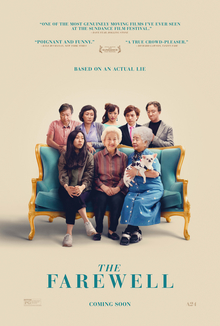
Thanks to my Chinese, I understand the Mandarin dialogue and the Chinese cultural nuances in the movie “The Farewell” directed by Lulu Wang. The movie title in Mandarin Chinese literally means “DO NOT TELL HER” (bie gao su ta). I find it more apt for the movie than the English title. After all, the movie is about a family secret—the grandmother in the movie is diagnosed with terminal lung cancer and is predicted to have a few months left to live. Her children, grandchildren, sister, and even physician are all hiding the truth from the patient.
Why? According to the film, one, the concealment of cancer diagnosis from the patient is a common practice in China. A cancer patient is more likely to die from fear than from the disease itself; second, a cancer patient should live without the burden of knowing he/she is dying. This is from the viewpoint of an involved family member; third, in Chinese society, an individual’s life belongs to a collective group of people, which differs from the Western individualism.
As I was watching the movie, I couldn’t help drawing a parallel with my memoir, “Golden Orchid”. I’ve also kept a similar family secret. My father decided not to reveal the truth to my mother that she had terminal colon cancer. And his decision drove me to keep a “white lie” as the physician in the movie described it. Thinking back, I must have been a tough kid to share the load of a family secret, or to just begin learning how to handle death in a delicate Chinese way.
The movie highlights the Chinese perception of America and Chinese family values. Filial piety, family reunion dinners, a wedding banquet, so on and so forth. And yet, these Chinese traditions are, as a matter of fact, facing a challenge with the rapid modernization of Chinese society. Modern Chinese are willing to accept, and aspire to, the Western ideas and lifestyles. Chinese millennials are more individualistic than any generation of their forebears. Urbanization and AI technology allow modern Chinese to break traditions for happiness and self-contentment. It should be a common sense for many well-to-do Chinese families: How come Nai Nai in the movie isn’t sent abroad for medical treatment? Why does Billi’s family leave the dying Nai Nai after the wedding? Why doesn’t Billi or her parents stay if Nai Nai’s days are numbered?
Perhaps I ponder too much because the movie theme is too close to home. But like what I learn in MFA classes, the reader’s emotion needs to be built on as the story progresses. Perhaps the title “The Farewell” gives too much weight to the death, but the fictitious family in the movie has fallen short of delivering that power of the family secret. In addition to that, a spoiler here, the closing credit gives the audience hope. No wonder the movie is categorized as drama—slash—comedy. Given the restricted time and budget of a feature film, the Chinese elements may work in a movie to enrich its storytelling. But just like how an American would warn a foreigner, don’t believe everything you see in a Hollywood movie. It doesn’t represent the real American life. I think a real Chinese family will handle a similar family crisis more profoundly.
The movie has an all-Asian cast regardless of the nationality of the cast members. By ethnicity, they are all East Asians, from Awkwafina (aka Nora Lum) to Zhao Shuzhen, from Aoi Mizuhara to Diana Lin. It’s high time Asian actors take on leading roles in Hollywood films. Kudos to that!
If you want to know about an ordinary Chinese family handling a family crisis, “Golden Orchid: The True Story of An Only Child in Contemporary China” is a good starter. Don’t forget to share your thoughts with me!
